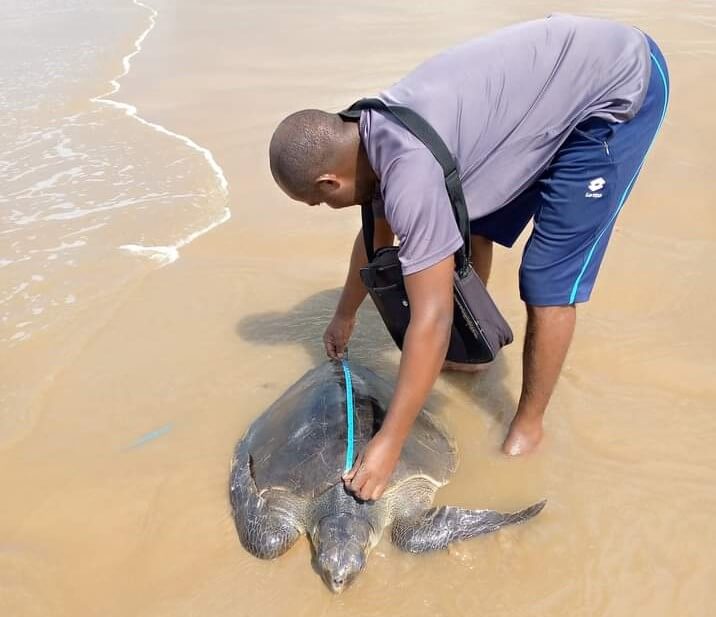AKASSA, BAYELSA – Almost everyone else went for commercial fish like croaker, but when Cryson Happy started fishing at age 14, he went after something else.
“I was fully involved in killing sea turtles,” Happy, now 41, said. “It is good meat, and it was like a business, and we took it like a blessing from God. You sell some parts [to] make money and eat some parts.”
Okumbiribeleu, his community, is one of 19 communities that make up Akassa, a clan occupying three barrier islands prowling toward the point where the River Nun meets the Atlantic Ocean in Nigeria’s oil-rich Bayelsa State.
Sea turtles play significant roles in maintaining the health of the world’s oceans. They graze on seagrasses to prevent overgrowth and also prey upon jellyfish, a predatory species that eat commercial fish.
Also, when sea turtles come up to the beach to nest, their eggshells become manure that supports the growth of dune or beach plants. In turn, dune plants act as barriers against sea level rise and storm surge. Locals in communities like Okumbiribeleu also harvest vegetables from these plants for food.
Yet, tens of thousands of sea turtles are harvested, poached, illegally traded or slaughtered for meat every year. Their skin and shell are harvested for jewellery, decoration, and traditional medicine making. This results in a sea turtle population decline.
Six of the world’s seven sea turtle species (green, hawksbill, kemp’s ridley, leatherback, loggerhead, and olive ridley) are currently threatened and endangered.
Five species (loggerhead, hawksbill, green, leatherback, and olive ridley) nest along Nigeria’s coastline. But they are among the common bushmeat species in the country, according to WildAid, a global wildlife conservation group. And there are open markets here where they are slaughtered and sold.
“People still see sea turtles as meat [and] locals say the eggs of sea turtles are sweet,” Henry Ebiegberi, secretary general of West Africa Sea Turtle Conservation Network, told Prime Progress.
“On the water, they go through the stress of human activity like fishing and get entangled by the nets. Sometimes, when you go to the beach, you see some already dead. So each day, the population of sea turtles is declining.”
Akassa has a 320-square-kilometre forest land and a coastline that stretches some 48 kilometres, the longest of Nigeria’s 853km coastline. This makes most of its member communities fisherfolk. Happy’s Okumbiribeleu community has a sea turtle beach where three species nest.
Protecting sea turtles
In 1997, Statoil (now Equinor), a Norwegian oil company, and British Petroleum conducted an environmental impact assessment of the Niger Delta region. The review later identified Akassa as one area in the oil-producing Brass Local Government Area likely to suffer the devastating impact of future oil spills with grave economic and environmental consequences. One recommendation was to create a community development plan.
This led to the formation of the Akassa Development Foundation or ADF. Later, Statoil involved Pro-Natura International or PNI, an international development organisation, to work with the ADF to facilitate community-led development.
PNI immediately began implementing a “participatory rural appraisal programme” that involved locals in projects covering health, infrastructure, education, agriculture, and, most importantly, the environment.
One morning in May 1997, a team from PNI visited Government Secondary School, Akassa, where Happy was a student and organised an awareness campaign on endangered sea turtles as part of its environmental conservation projects.
At about the same time, a US sea turtle conservationist called Angela Formia visited Akassa for sea turtle research. Formia, who now leads the West and Central African sea turtle projects at the African Aquatic Conservation Fund, volunteered to train locals in sea turtle conservation strategies.
This led to the establishment of a sea turtle club under ADF and a station that still serves as a mini office where volunteers come to pick up equipment before going for surveillance functions on the beach.
‘We are rescuers’
Happy, who participated in PNI’s campaign and Formia’s training, during which he learned about the dangers of killing sea turtles, became one of 100 turtle club members who volunteered to regularly move around coastal communities to ensure sea turtles coming to nest are not killed.
Every day, he visits the sea turtle beach in his community (Okumbiribeleu) with other club members to rescue turtles from their captors, release them back to the Atlantic Ocean, and ensure that their eggs are not poached.
“[When] we were killing sea turtles then, we didn’t know we were harming the environment,” Happy said. “Now [we] know, so… we are rescuers and no longer killers of sea turtles.”
Before they release a turtle into the wild, these volunteers notify ADF. ADF sends a five-person team led by Ebiegberi, a sea turtle conservationist in Akassa, to first identify their species and measure their length and width.
Because sea turtles travel thousands of miles, the team also takes migration data. The data collected yearly are analysed for research purposes and to determine the number of sea turtles caught and released back to the wild yearly, the number coming in to breed, and the number of eggs found.
Since 2017, they have rescued and released 122 sea turtles. Sometimes, fisherfolk voluntarily bring sea turtles they catch during their fishing activities to the foundation. To encourage them, ADF gives an incentive of N3000 ($6.7) for every turtle surrendered or new fishing gear.
“They are very happy when they get a small token,” Inatimi Odio, ADF’s secretary, said. “Sea turtles were a delicacy in Akassa, but everybody is now conscious.”
Meanwhile, since its incorporation on November 21, 2001, ADF has taken over all PNI’s facilitating and coordinating roles for local development. But after 20 years of funding all ADF-implemented projects, Statoil stopped the funding in 2017.
ADF now sources funds from wealthy community elites, chiefs (who make up its 11-member board of trustees) and their friends to run its community projects, including sea turtle conservation.
But most of ADF’s decisions are made through its general assembly comprising 38 representatives from each community in Akassa.
“It is a bottom-up [approach], where communities discuss their issue, pass it to their representatives, and their representatives present the needs of the community they represent during the [general assembly] meeting,” Odio said. “That is how ADF became a model for participatory development.”
Injured turtles die
But ADF does not have rehabilitation centres (due to limited funding) to properly treat sea turtles injured during fishing activities. And releasing injured and untreated turtles into the ocean put the creature at risk as their injury (blood) often attracts predatory aquatic animals like sharks.
“Sometimes, dead sea turtles are washed ashore,” Odio said. “Part of the plans in the near future is to set up a rehabilitation centre.”
In the meantime, Happy has resolved to save as many turtles as possible by reaching out and educating more fisherfolk about the advantage of protecting sea turtles.
“I don’t wait for the team to gather before I do sensitisation; I do that every time, even during fishing,” he said.
This story was produced with the support of Nigeria Health Watch through the Solutions Journalism Network, a nonprofit organisation dedicated to rigorous and compelling reporting about responses to social problems.
In Akassa, Nigeria, Cryson Happy, who formerly poached sea turtles, now protects them. Sea turtles, vital for ocean health and coastal ecosystems, are endangered due to harvesting for meat, jewelry, and traditional medicine. The Akassa Development Foundation (ADF), formed as part of a community development plan by oil companies, fosters sea turtle conservation through education and volunteer efforts. Since 2017, 122 sea turtles have been rescued and released back into the wild by ADF volunteers, who also receive incentives for their conservation efforts.
However, ADF faces challenges like limited funding and lacks rehabilitation centers for injured turtles, posing risks to their survival upon release. Despite funding ceasing in 2017 from Statoil, ADF continues its projects with funds from community elites and chiefs. The foundation emphasizes a bottom-up approach in decision-making, engaging community representatives. Happy, a key figure in these efforts, educates fisherfolk on the importance of protecting sea turtles.
While continuing to seek more reliable funding sources, ADF plans to establish a rehabilitation center for injured turtles in the future to enhance their conservation impact.






